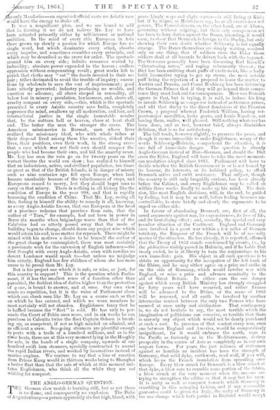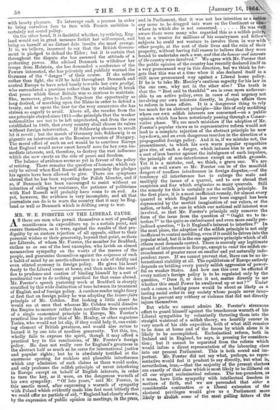THE ANGLO-GERMAN QUESTION.
THE German slow match is burning still, but as yet there is no flame, and consequently no explosion. The Duke of Angustenburg—a person apparently six feet high, blond, with
grave kingly ways and slight stutter—is still living at Kiel ; but if he reigns, as Holsteiners say, he at all events does not govern. The Commissioners, on the other hand, arc at Altona, governing without reigning ; but their only conspicuous act has been to levy duties against the Danes, intending, it would seem, to show that Denmark is foreign to the Duchy, but only showing their own doubt whether Schleswig is not equally strange. The Danes themselves are simply waiting, resolved only on one thing, that if soldiers cross the Eider those soldiers shall at all hazards be driven back with the bayonet. The Germans generally have been discussing Earl Russell's "threatening notes," and raging vehemently thereat; the Diet has been emitting short puffs of excitement, like a badly built locomotive trying to get up steam, the most notable puff being the rejection of a proposal to leave the matter to Austria and Prussia, and Count Rechberg has been informing the German Princes that if they will go beyond their compe- tence they must look out for consequences. Herr von Bismark agrees to that, but is trying, it is said, to induce his king to invade Schleswig as conqueror instead of as German prince, and add that duchy to the direct dominions of the Prussian Crown, a proposal whereat Frederick William, having ser- jeant-major moralities, looks grave, and Louis Napoleon, not having them, smiles, well pleased. Still nothing whatever has been done, and as rest, however brief, always diminishes delirium, that is so far satisfactory.
The lull tends, however slightly, to preserve the peace, and though it seems impossible to make Englishmen, weary of the words Schleswig-Holstein, comprehend the situation, it is one full of immediate danger. The question is already Anglo-German instead of Dano-German, and should the Diet cross the Eider, England will have to take the most moment- ous resolution adopted since 1815. Parliament will have to decide whether the British Government is or is not bound by its honour, its interests, or its habitual policy, to afford Denmark active and swift assistance. That subject, though the country is still only languidly curious, has been already before the Cabinet, and every Englishman may be called on within three weeks finally to make up his mind. The deci- sion, like most English decisions, will, in the end, be guided by feeling, but it may be as well, before feeling becomes un- controllable, to state briefly and clearly the arguments to be urged on either side.
In favour of abandoning Denmark are, first of all, the usual arguments against war, its expensiveness, its loss of life, and its brutalizing effect; and, secondly, the special and very peculiar situation of the Continent. England and Germany once involved in a great war within a few miles of German territory, the Emperor of the French will be of necessity master of the situation. He has already, it is reported, affirmed that the Treaty of 1852 stands condemned by events, i e., by the plebiscitunt visibly passed in Holstein, and if he holds that treaty ended, he is at liberty to turn the conjuncture to his own immediate gain. His object in all such questions is to obtain an opportunity for the occupation of the left bank of the Rhine, and he may either agree on a price and strike in on the side of Germany, which would involve war with England, or seize a price and advance nominally to the aid of Great Britain. In either case the one danger against which every British Ministry has strongly struggled for forty years will have occurred, and either France will be advanced to the Rhine, or the scene of 1805 will be renewed, and all earth be involved by another internecine contest between the only two Powers who have secured at once unity and civilization. That contingency is, we do not hesitate to say, the most terrible which the imagination of politicians can conceive, so terrible that there is scarcely any object which would not be dearly purchased at such a cost. Iu presence of that contest every war, oven one between England and America, would be comparatively insignificant, for it would embrace the earth, rage in the Pacific as furiously as in the Mediterranean, destroy prosperity in the centre of Asia as completely as in our own seaport towns. For years the just reliance of statesmen against so horrible an incident has been the strength of Germany, that solid dyke, earthwork, mud wall, if you will, which keeps the French inundation from spreading over Europe. Every blow struck for Denmark is a blow aimed at that dyke, a blow sure to crumble some portion of the fabric, a blow struck at the very moment when the masons are trying to strengthen the edifice so that it may last for ages. It is unity as well as conquest towards which Germany is stumbling in this annoying fashion, and if any reasonable guarantee could be given for Italy, the uaity of Germany is the one change which both parties in England would accept with hearty pleasure. To interrupt such a process in order to bring ourselves face to face with French ambition is certainly not sound policy. On the other hand, it is doubtful whether, by retiring, Eng- land would not in great measure forfeit her self-respect, and bring on herself at no distant date insults she must avenge. It is, we believe, incorrect to say that the British Govern- ment is pledged to defend the Eider ; but it is certain that throughout the dispute she has assumed the attitude of a protecting power. She advised Denmark to withdraw her troops from Holstein, she has demanded a conference of the Powers interested, she has privately and publicly warned the Germans of the " danger" of their course. If she retires rather than fight, she will be held throughout Denmark and central Europe to have acted basely towards her own proitge, who surrendered a province rather than by retaining it break that peace which Great Britain was so anxious to maintain. She, moreover, gives to Louis Napoleon the opportunity so long desired, of marching upon the Rhine in order to defend a treaty, and so opens the door for the very occurrence she has striven so eagerly to avoid. Above all, she recedes from the one principle obeyed since 1815—the principle that the weaker nationalities are not to be left unprotected, and from the one established in 1860, that every country shall choose its rulers without foreign intervention. If Schleswig chooses to revolt let it revolt ; but the march of Germany into Schleswig is as gigantic an intervention as the Russian invasion of Hungary. The moral effect of such an act would be to convince Europe that England would never exert herself save for her own im- mediate interests, and, therefore, to destroy the vast influence which she now exerts on the side of peace and freedom.
The balance of evidence seems as yet in favour of the policy of retiring. There remains the question of honour, which can only be solved when Earl Russell defines precisely the pledges his agents have been allowed to give. There are symptoms abroad that he has been repeating the Polish blunder, and if so, if Denmark has been encouraged to resist without an intention of aiding her resistance, the patience of politicians with Earl Russell will probably have come to an end. As yet, however, the evidence is very incomplete, and all that journalists can do is to warn the country that it may be Eng- land as well as Denmark which is drifting away to war.































 Previous page
Previous page